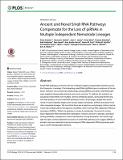Ancient and novel small RNA pathways compensate for the loss of piRNAs in multiple independent nematode lineages
Abstract
Small RNA pathways act at the front line of defence against transposable elements across the Eukaryota. In animals, Piwi interacting small RNAs (piRNAs) are a crucial arm of this defence. However, the evolutionary relationships among piRNAs and other small RNA pathways targeting transposable elements are poorly resolved. To address this question we sequenced small RNAs from multiple, diverse nematode species, producing the first phylum-wide analysis of how small RNA pathways evolve. Surprisingly, despite their prominence in Caenorhabditis elegans and closely related nematodes, piRNAs are absent in all other nematode lineages. We found that there are at least two evolutionarily distinct mechanisms that compensate for the absence of piRNAs, both involving RNA-dependent RNA polymerases (RdRPs). Whilst one pathway is unique to nematodes, the second involves Dicer-dependent RNA-directed DNA methylation, hitherto unknown in animals, and bears striking similarity to transposon-control mechanisms in fungi and plants. Our results highlight the rapid, context-dependent evolution of small RNA pathways and suggest piRNAs in animals may have replaced an ancient eukaryotic RNA-dependent RNA polymerase pathway to control transposable elements.
Citation
Sarkies , P , Selkirk , M E , Jones , J T , Blok , V , Boothby , T , Goldstein , B , Hanelt , B , Ardila-Garcia , A , Fast , N M , Schiffer , P M , Kraus , C , Taylor , M J , Koutsovoulos , G , Blaxter , M L & Miska , E A 2015 , ' Ancient and novel small RNA pathways compensate for the loss of piRNAs in multiple independent nematode lineages ' , PLoS Biology , vol. 13 , no. 2 , e1002061 . https://doi.org/10.1371/journal.pbio.1002061
Publication
PLoS Biology
Status
Peer reviewed
ISSN
1545-7885Type
Journal article
Description
Date of Acceptance: 02/01/2015Collections
Items in the St Andrews Research Repository are protected by copyright, with all rights reserved, unless otherwise indicated.

